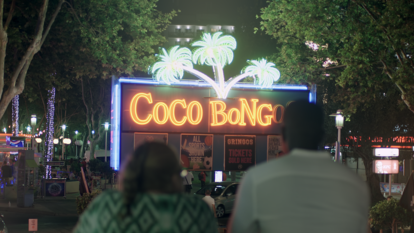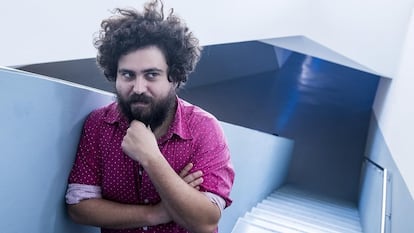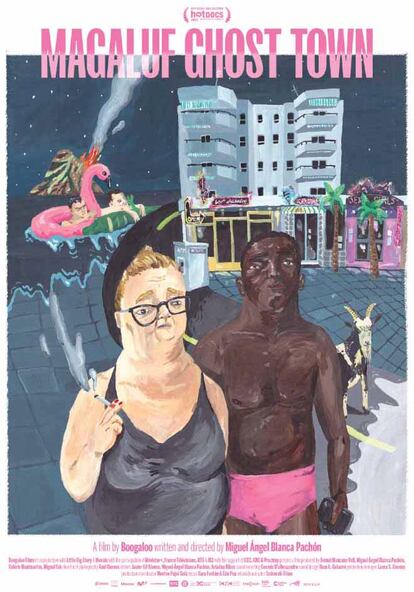‘Magaluf Ghost Town,’ a look at the weirder-than-fiction reality of Mallorca’s notorious party resort
One of ‘Variety’ magazine’s 10 emerging Spanish filmmakers, Miguel Ángel Blanca has made a documentary about the tourist destination that blends fact and make-believe, horror and comedy

In early March, Variety magazine published a list of 10 emerging Spanish filmmakers to look out for. Topping the list was Miguel Ángel Blanca, born in the Catalan city of Sabadell in 1982. He is already familiar to some as the front man of the Barcelona band Manos de Topo, dubbed “the rodents of sarcasm” by this newspaper in 2016. “The funniest thing is that no one on the list was exactly young,” notes Blanca from his current home in Barcelona.
Blanca owes the honor to his latest oeuvre, Magaluf Ghost Town, a hybrid documentary with elements of horror and comedy about one of the most notorious party resorts in Mallorca. “The film is a love letter to these decaying tourist spots that were once sort of incredible but which have been spoiled with time, losing their rationale,” he explains. “Magaluf is a fascinating place, a fiction in itself – the perfect place to build new myths and legends for these kinds of locations.”
In 2003, Blanca graduated from the Cinema and Audiovisual School of Catalonia (ESCAC). Around that time, he began writing songs with fellow student and future film director Alejandro Marzoa, and together they founded what would become Manos de Topo. Their first album, Ortopedias bonitas (2007), was included by the music magazine Rockdelux in its list of Best Albums of the 2000s.
When the band’s album Caminitos del deseo was released in 2014, the pair’s interest in cinema was already ramping up. That year, Blanca directed his first feature film, Después de la Generación Feliz (or After the happy generation) under the pseudonym Guillothina. He also released Un lloc on caure mort (or A place to drop dead) with Raúl Cuevas, a documentary on how the singer of the band Autodestrucció juggles his middle-class life and his punk career, and for which Blanca received the Best National Documentary Award at the 2014 In-Edit Festival. In 2015 he released La extranjera (or The foreigner), a sci-fi documentary hybrid that contemplated the gentrification of a Barcelona invaded by tourism, sowing the seeds for his later project in Magaluf.
Magaluf: the world’s biggest movie set

“There are many versions of Magaluf,” Blanca explains. “When I went for the first time, I wanted to check if everything they said was true: the madness, the ‘balconing’ [jumping between hotel balconies], the ‘mamading’ [fellatios].” In the summer of 2014 there was global indignation at a video of a contest in which a drunk girl practiced fellatio on several men in exchange for drinks. “But what exactly was Magaluf?” asks Blanca, formulating the question that inspired the piece. “What was truly going on there? Why did people want to go there on vacation? Suddenly, I realized that the place was a kind of tourist utopia where anything is possible.”
Consequently, Blanca set out to make a documentary that would also build fictions within real space. “We have played with the buildings as if they were TV sets,” he says. “It’s clear that it’s a murky, controversial place, but a lot of magic can also emerge from it.” Although the team arrived on the island in 2015 with the intention of filming the mostly British tourists, they soon realized that the really interesting aspect was the local population that had to deal with them every year. “How do they do it? How do they manage this love-hate relationship with all these people who feed them while destroying their town?” the director muses. “We found it a super-interesting duality. There was also a certain respect for the tourists. When you walked into a local bar, everyone would go quiet.”
To make the documentary they had in mind, they needed to find the right people. They realized that many of those they talked to were suspicious, believing they were going to shoot the umpteenth sensational report on Magaluf. Until finally they stumbled across Rubén and Tere, the two locals around whom the plot revolves.
“Rubén was a 17-year-old who was studying to become a waiter,” says Blanca. “He felt that his future was already determined and he found it very boring. I thought he was a very cool character to talk to about how a teenager grows up in a tourist town like this one. To build the fictional aspects of the documentary, I asked him: what would you like to do with the tourists? If you had to shoot your own movie, what would you do? Then he confessed that there were things he had experienced involving tourists that were not too different from fiction; he told me about the relationship young locals have with drunken holidaymakers when they are on the beach at 5am.”

“I like stories in which a unique universe is built as, for example, in the comedy Ice Haven by Daniel Clowes; with characters that go about their business in a city with very strange but very specific rules, making it impossible to know if you are watching a comedy or a drama,” says Blanca.
“We made a Spanish costumbrista comedy [ containing detailed and realistic depictions of local customs] thanks to the character of Tere, who is like a kind of Carmina [the 58-year-old protagonist of the movie Carmina or Blow Up]; but on the other hand, we have the vampires and zombies that come out at night, which are the tourists. How could we put all these things together and make them work? I think we got that mix right and it’s one of the things we’re most proud of about the film.”
Magaluf Ghost Town will tour the Spanish documentary festival circuit and will be released in theaters nationwide later this year.
English version by Heather Galloway.
Tu suscripción se está usando en otro dispositivo
¿Quieres añadir otro usuario a tu suscripción?
Si continúas leyendo en este dispositivo, no se podrá leer en el otro.
FlechaTu suscripción se está usando en otro dispositivo y solo puedes acceder a EL PAÍS desde un dispositivo a la vez.
Si quieres compartir tu cuenta, cambia tu suscripción a la modalidad Premium, así podrás añadir otro usuario. Cada uno accederá con su propia cuenta de email, lo que os permitirá personalizar vuestra experiencia en EL PAÍS.
¿Tienes una suscripción de empresa? Accede aquí para contratar más cuentas.
En el caso de no saber quién está usando tu cuenta, te recomendamos cambiar tu contraseña aquí.
Si decides continuar compartiendo tu cuenta, este mensaje se mostrará en tu dispositivo y en el de la otra persona que está usando tu cuenta de forma indefinida, afectando a tu experiencia de lectura. Puedes consultar aquí los términos y condiciones de la suscripción digital.








































